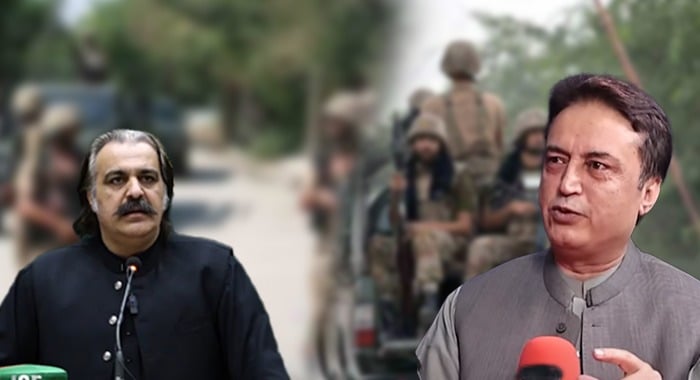Arif Yousafzai
Recent developments in the region ranging from targeted operations in tribal districts to the high-level diplomatic outreach between Pakistan and Afghanistan signal a decisive moment for both national security and regional connectivity. As the Deputy Prime Minister Ishaq Dar leads a key delegation to Kabul to push forward the Red Batrack and railway rehabilitation projects, there’s a simultaneous undercurrent of political disarray and public anxiety back home, especially in Khyber Pakhtunkhwa.
The visit to Kabul, accompanied by Foreign Minister Amir Muttaqi of Afghanistan, reflects growing interest in reviving regional linkages and opening corridors for trade and diplomacy. The long-neglected British-era railway track from Peshawar to Landi Kotal is finally set to be revived. Simultaneously, the Torkham-Jalalabad motorway crucial for regional trade has been prioritized. These developments are indeed vital, and after years of mistrust, they offer a potential roadmap for mutually beneficial relations between two uneasy neighbors.
Let us be clear: Pak-Afghan relations are far from ideal. There exists a deep-rooted trust deficit. But with China nudging both countries toward cooperation, embassies being reinstated, and bilateral visits resumed, some groundwork has been laid for meaningful engagement. Regional peace, stability, and economic integration hinge on these very initiatives. As the proverb goes, “You can change everything but not your neighbors.” It is, therefore, pragmatic for both countries to abandon hostility in favor of economic and diplomatic connectivity.
However, this progress is being overshadowed by the deteriorating security situation in Khyber Pakhtunkhwa. Targeted operations have reportedly resumed in the tribal belt. The issue has reentered the national spotlight following a meeting of key officials and a recent press conference by the Prime Minister of Khyber Pakhtunkhwa, who has admitted to receiving intelligence reports pointing to a renewed counter-terror operation.
In a province already scarred by past military operations like the Swat offensive that displaced hundreds of thousands—such news brings back haunting memories. But what makes the situation more troubling is the lack of political coherence. The Awami National Party (ANP), which once owned and justified those operations, is now questioning their legitimacy. When in power, the ANP not only endorsed such operations but actively participated in their implementation. Now, out of power, the party takes a 180-degree turn, using its platform to cast doubt on the very tools it once deployed. This double standard erodes public trust and diminishes the credibility of political discourse.
One must ask: Where does the ANP stand on matters of principle? Is it in favor of negotiation, or military action? Is it against Article 245 of the Constitution that permits the deployment of the military in aid of civil power, or does it secretly rely on it when in government? These are not rhetorical questions they demand clear answers from the party that once claimed to lead Pakhtun resistance with moral clarity.
This political ambiguity is not exclusive to the ANP. The current KP government under Chief Minister Ali Amin Gandapur has also shown an unwillingness to take full responsibility for military operations conducted under Article 245. While the province requests military assistance citing worsening security, it simultaneously distances itself from the consequences. This is a dangerous precedent. If the provincial government believes military deployment is unnecessary, it should formally revoke the request under Article 245. Otherwise, the leadership must show the courage to defend its decisions, not hide behind the federal umbrella or scapegoat the armed forces.
Adding fuel to the fire is the recent revelation from a high-level Apex Committee meeting where Gandapur reportedly admitted that he publicly defames militant groups. “Yes, I do,” he is quoted as saying. “And if I don’t, what should I do?” His words, allegedly spoken in response to accusations from opposition lawmakers, underscore the desperation and powerlessness felt even at the highest levels of provincial leadership. This raises a deeply unsettling question: If the Chief Minister of Khyber Pakhtunkhwa believes his only option for survival is to denounce militants without institutional backing, then what remains of the state’s writ?
Even more worrying are the accusations of extortion from seminaries and revelations made by opposition leader Amir Muqam’s brother, claiming direct threats and demands for protection money in the province. If such claims are true, and if these are being swept under the rug at media briefings as some reports suggest then the government is actively failing in its most basic duty: to protect its citizens.
The disconnect between political narratives and ground realities is widening. Whether it’s the ANP’s opportunistic revisionism or the Gandapur-led government’s half-measured policies, the people of Khyber Pakhtunkhwa are once again being asked to bear the brunt of decisions made behind closed doors.
It is time for political parties to abandon their addiction to narrative manipulation. Security policies must not change with the tides of political fortune. The public deserves clarity, responsibility, and long-term commitment. More importantly, both provincial and federal governments must stop using Article 245 as a revolving door for military involvement while ducking accountability.
Regional progress with Afghanistan is vital, but it cannot come at the cost of internal instability. Pakistan’s leadership must confront militancy with both resolve and transparency. And that means not just holding militant actors accountable but also demanding accountability from those in power.





